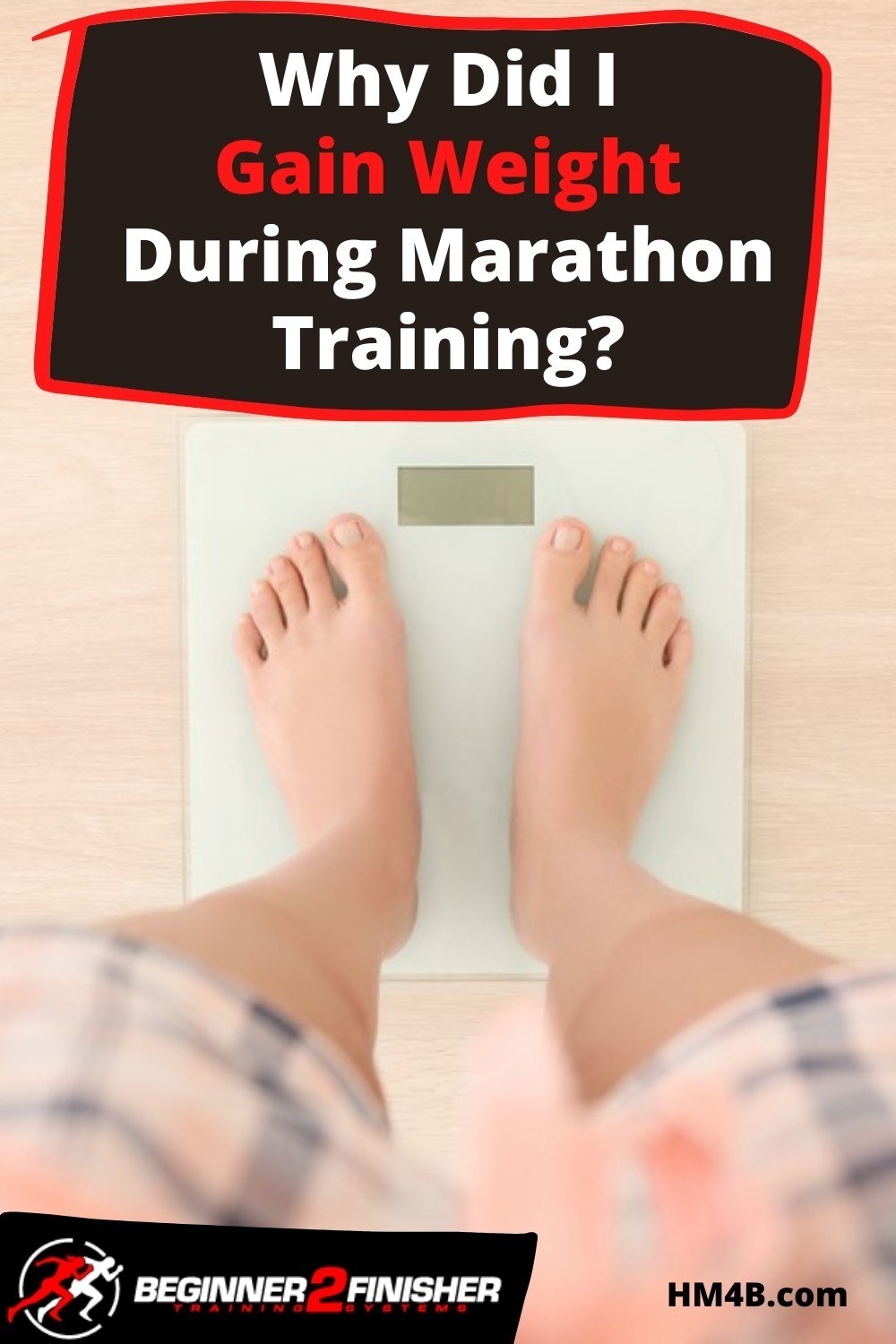You may have started marathon training with the intention of losing weight. But sometimes the opposite can happen. Marathon training can actually make you gain weight by either increasing water retention, increasing muscle mass, or by making you want to eat more.
Training for a marathon involves a lot of preparation and precise planning. Making sure your nutrition and your routine are in check is crucial to keep you progressing in the right direction. As long as you are consistent, you shouldn’t gain weight while training for a marathon.
Our bodies are complex things. By design, our body does everything to hold onto any weight we have. Our ancestors needed fat reserves in order to survive once food became scarce. Nowadays that same mechanism sees us gaining weight easily and makes losing it difficult.
So why did I gain weight during marathon training?
Let’s look at the question in some more detail …
Why Marathon Training Might Mean Gaining Weight
Water Retention
When we exercise, our muscles become tired. Muscle fibers actually tear during the exercise and need to be repaired. Muscles retain water in order to rebuild through protein synthesis. If you weigh yourself soon after exercising, even the next day, you may be heavier due to water.
A good way to keep proper track of your weight during marathon training is to only weigh yourself once every two weeks. This will show your results better, as water weight will be less of a factor. As your body burns fat, the difference is gradual, whereas water weight can fluctuate.
Related: Why Do I Feel Tired After I Run (besides exerting energy)?
So How Do I Lose Water Weight?
When you have sore stiff muscles after exercising, they are filled with water. Doing some light stretches and/or yoga will help the muscles relax and will release some of that water. You should be stretching anyway, as it helps muscles heal faster and stronger (Top 5 Exercises To Get Rid of Water Retention).
You can store as much as 10lbs of extra water weight at any given time. If you do everything right, within two to three days you can lose that water weight again, once your muscles are back and better than ever.
There are even some supplements that claim to reduce water retention. Do some research into this, however, as water retention is an important part of exercise and recovery. Your body has evolved to retain water in order to repair muscles quickly and get back running.
Muscle Gain
Even though you look thinner and more toned, you might have actually gained a few pounds. This could be caused by an increase in muscle mass at the same time as losing fat. 1lb of muscle is roughly 18% denser than fat meaning the same volume of it will weigh more.
If your runs are getting easier and you are getting faster and stronger, then don’t worry about the weight gain. Muscle is a good thing to have and can help with speed as well as endurance. If however, you are noticing fat gain and not progressing in your runs, you might have a problem.
Having more muscle is beneficial to our bodies because it steadies our bodies and makes us less prone to injuries. Your back and core muscles are especially important to running because they work to keep you upright as you run. You may feel abdominal soreness after long runs.
Doing some light-weight lifting exercises can be very beneficial for running. Making sure your body is strong means you can protect your joints from strain. This is a great idea alongside your running regiment. Just make sure not to overdo it, as weightlifting can make you very sore.
Related: Why Am I Having Trouble Gaining Muscles While Running?
Calorie Intake Increase
Just like when you’re not marathon training, eating too much will make you gain weight.
If our bodies are given more calories than they burn, excess calories will be turned into fat to be stored. Even if you feel extremely hungry after a long run, you might not need as much as you think.
The average 6-mile run—which takes roughly an hour for intermediate runners—will burn between 700 and 1000 calories depending on your body size. So to not lose weight, you will need to replace those 700-1000 calories.
If however, you aim to lose weight, eating normally after that 700-1000 calorie run will mean your body will use your current fat stores as energy. Your body will burn your fat, turning it into energy, and it will be breathed out as carbon dioxide. Believe it or not.
Doing a long run may give you the idea that you can now eat whatever you want. Often people will claim they have ‘earned’ their takeout or that second glass of wine. But, if you want your hard work to not go to waste, eat as you normally would and let the exercise make a difference.
A large takeout pizza can easily be 2000 calories, roughly 300 per slice if you’re having pepperoni. Despite how hard your run felt, you really can’t outrun a bad diet.
If you experience a lot of hunger after running, try eating food that is high in volume. Foods like cucumber and lettuce can fill out a salad and leave you feeling full. They contain hardly any calories as well as great vitamins and water content.
Stay away from calorie-dense foods like potato chips or candy. These foods are extremely high in calories while being low in volume.
Chips especially are laden with oil and salt that just isn’t good for anything besides flavor. Treat yourself every once in a while but don’t overeat after training.
Related: Why Am I Struggling To Lose Weight While Running
Your Body Is Storing Carbohydrates
Just like water retention, your muscles can be heavier due to carbohydrate storage. When you eat carbohydrates, some of them are made into glycogen which is stored in the muscles. When you move that muscle the glycogen is used up.
As your muscles get bigger and more efficient, they become better at storing glycogen. While this means you will be able to run for longer, and you will recover faster, it also means that the muscles will start to weigh more.
Likewise, the process of storing glycogen in the muscles requires water, which will add weight to your body. If you are seeing weight gain, but your runs are getting easier and faster, then you have nothing to worry about. It is simply your body getting better at storing useful energy.
There are cases where you want to top off and store the maximum about of carbs prior to your race known as – carb-loading. For more information about carb loading check out: What is carb-loading and why long-distance runners do this?
Ways To Lose Weight From Marathon Training
Marathon training is usually an easy way to lose weight. It is simply calories in against calories out. Running longer and longer distances each week will mean your body is always in need of more fuel. If you plan accordingly, you shouldn’t gain weight.
Calculating And Counting Calories
Using a fitness app such as Strava, or a fitness monitor watch, you can actually track how many calories you burn while running. Addin your age, gender, and weight, and the software will work out how much you have burned during a run.
You can then use this data to work out how your diet should be changed to account for the exact amount of calories you have burned. Eye-balling calories are rarely accurate and will give you far fewer results than if you measure everything.
Alongside tracking your calories burned you will need to monitor your calories. Apps and websites like MyFitnessPal provide a simple format for entering exactly what food you ate, and how much of it. It can even be set to give you goals and exact amounts to eat each day.
Although it may seem like hard work, monitoring your data can make your training that extra bit more precise. Try it for a few weeks and see if you notice any difference. Some Olympic athletes run and eat based on feel, but others will struggle to instinctively know what is best for them.
Getting A Trainer
There are many trainers out there who are happy to help you train for a marathon, for a price of course. A trainer will go over your exercise plan, your nutrition, as well as your sleeping routine. They will give you important advice on what to eat and when to eat it.
Take the hassle and fuss out of deciding what to eat every night after a long and hard run. Trainers know best and have years of experience to help you get to where you need to be. They may even have advice about recipes or how to not get so hungry so fast.
Fueling Properly
Making sure you eat enough during exercise will help you to not overeat once you finish. There are specialized foods that are designed for snacking on as you run. They will be higher in sugar and low-release carbohydrate that will keep you running for longer.
If you get in from a run and attack whatever is in the fridge, you can easily undo all the hard work you have just done with your run. A few beers could even set you back as much as 500 calories. That’s the equivalent of roughly 3 to 5 miles.
Likewise, eating enough, in general, will mean that you can exercise well enough to see some benefits. Underfuelling can mean that your body can’t perform well enough to improve for next time. Your muscles won’t repair as well and you won’t be stronger next time.
Finding this balance is difficult and will take some time. Once you find the balance however there will be no stopping you. You will improve and be able to run that marathon with ease.
For a well-researched post including fueling charts, check out How to Fuel For your Half Marathon or Marathon Race!
On Race Day
On the day of the marathon itself, you can probably afford to eat a bit more beforehand. A large balanced breakfast will fuel you for the had day ahead. However, eating a lot will be heavy in your stomach and will direct blood to your digestive system rather than your muscles.
A common practice among professional athletes is to eat a lot of carbs the day before a big race—so that their muscles are full of energy—then have a smaller breakfast the day of the race. This means that their stomachs won’t be as heavy.
What should I eat on race day?
Again, it is important to learn what works for you and what doesn’t. If you can easily run after a 2000 calorie breakfast then, by all means, that energy will be useful. Just remember to listen to your body and don’t force food in if it doesn’t want it.
Of course, after you’ve completed the marathon, enjoying your favorite foods will be guilt-free. The day after the marathon you will no doubt be heavier due to water retention. Don’t weigh yourself the next day, as you might be in for a shock.
5 easy ways to boost your motivation on race day
So Remember …
Keep in mind that weight gain is not always a bad thing. Our bodies can gain weight and be healthier than when they were lighter. Although weight gain is a term that is normally used to mean someone has gained fat, weight gain can also be caused by other things.
Are you looking for motivation to run a marathon? Here are 20 reasons why you should run a marathon.
Don’t Live By The Scale
Weighing yourself every day and expecting to see a difference is a quick way to become obsessed over your weight. This can lead to problems relating to eating. Eating disorders are becoming more and more common as people go to extremes to look a certain way.
If your body feels healthy and is doing the things you want it to do, then there is no problem. Marathon training is about being able to run a marathon, not about losing or gaining weight.
If you are 10lbs heavier, but feel fitter than ever, who is right to say you shouldn’t be that shape? It’s your body and you can do what you want with it.
So don’t get obsessed with weight, you’re training to run a marathon. Weight loss and health will be a welcome bonus to any fitness gains you make. Running a marathon is a mind game as much as anything else, don’t let worrying about your weight get in the way of that.
Typically, you should lose weight leading up to your marathon training cycle. Losing a little bit of weight or gaining a little bit of weight (during race week – carb-loading) is normal.
Other weight loss posts
3 Unconventional Things That Are Stopping You From Losing Weight
How To Lose Weight While Training For a Half Marathon
References
| Help support me and subscribe to my YouTube channel. YouTube video - 30 ways to make your runs less painful! Coach Scott's Credentials:
|
To sign up for a FREE half marathon training schedule, log sheet, and pace predictor CLICK HERE.

Recommended gear for runners
Connect with me:
| facebook.com/BeginnerToFinisher/ |



I definitely overeat while marathon training.